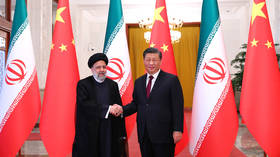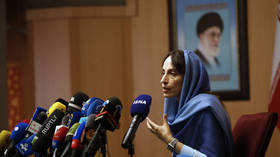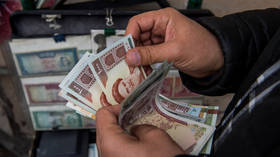Why the China-Iran partnership matters

President Ebrahim Raisi of Iran has concluded an official state visit to China, where he met with his counterpart in Beijing, Xi Jinping.
Ahead of the trip, Raisi published an article in China’s most elite party newspaper, the People’s Daily, speaking out against “unilateralism”, “violent measures” and sanctions, which both countries believe to be the main causes of instability in the world today.
The visit comes at a critical juncture in the two nations’ geopolitical prospects, as the editorial alludes to. Both countries are facing intensifying pressure from the United States, which strives to contain and militarily “checkmate” them. Having long since given up any pretence of upholding the Joint Comprehensive Plan of Action (JCPOA) with Tehran, which Donald Trump withdrew from, the US has imposed heavy sanctions on the country in a bid to try and cripple its economic and military development.
Similarly, the US has placed an ever-growing series of embargoes on China’s technology industries, and is seeking to encircle it militarily. This has led Beijing and Tehran to diversify their partnerships away from the West and strive to deepen ties with each other in multiple areas. Two years ago, they signed the 25-year Iran–China Cooperation Program, which tentatively pledged $400 billion in investment to the Middle Eastern country.
Why is China interested in Iran? Iran is a country with enormous untapped potential. In many aspects, it is a sleeping giant. Boasting a population of over 86 million, it is one of the most populous countries in the Middle East and, like China, is a so-called “civilization state,” that is a nation directly evolving from an ancient empire, Persia. While Iran has been subject to containment policies by the US since the revolution of 1979, it has proven to be a formidable adversary of the West and thus a critical potential strategic partner for China. This takes on further significance when its large-scale oil reserves are taken into consideration. China needs greater geopolitical support for facing off against the West and Iran is an important part of this.
Tehran, likewise, sees Beijing as its best bet to escape Washington-imposed containment. America’s blatant and wilful disregard of the JCPOA has ended any illusions Iran once held about the US and its allies, and recognizes that it is never going to be able to prosper unless it finds the political space to do so in a multipolar world. In other words, Tehran is placing its bets on helping establish a world where there are many powers, as opposed to one unilaterally dominated by the US, in which it might be able to undercut the influence of sanctions and hostile policies of US allies such as Israel. While this means deepening its ties with China, it also involves a close relationship with India and Russia, two other influential states who stand up to the US sanctions machine.
But in formulating this relationship, does China see Iran as an ally? Despite Beijing’s warm rhetoric and pledges to Tehran, the reality is more complicated. While the strategic element outlined above is important for Beijing, China is nonetheless attempting to court the entire Middle East simultaneously as part of a wider strategic balancing act. While China is willing to deepen its ties with Tehran, Beijing is not taking sides on conflicts within the Middle East, opting instead for neutrality and “stability” and signing strategic partnership agreements with the likes of Saudi Arabia, a rival of Iran’s.
All this leads to a key driving factor in China’s decision-making: access to oil and energy. China is the largest consumer and importer of oil in the world, and its over-reliance on importing oil via maritime routes through its eastern seaboard is a strategic weakness which the US would seek to exploit in the event of conflict. While Iran having its own oil is one obvious factor, what is more significant is that it also serves as a geographic land bridge into Asia from the Middle East, which makes it a critical part of the Belt and Road Initiative. While China can also buy oil from Saudi Arabia, the UAE and others, what these states cannot do is transport the oil to China over land, which would make it less vulnerable to potential US attacks. As a result, China is interested in creating infrastructure in Iran, as in neighbouring Afghanistan.
Ultimately, Iran is critical to China’s national security in multiple areas: geopolitics, energy and geography. Both sides have come to recognize the other as one of their most important geopolitical partnerships. In an era of growing US hostility, aggression and coercion, China and Iran are coming together as two states that understand the importance of multipolarity and finding common ground to develop amid Western sanctions. China offers growth for Iran, while Iran also offers security, energy and the potential of a sleeping giant in the Middle East. Both countries want to build a very different world, one which the US is doing everything it can to prevent.
The statements, views and opinions expressed in this column are solely those of the author and do not necessarily represent those of RT.














